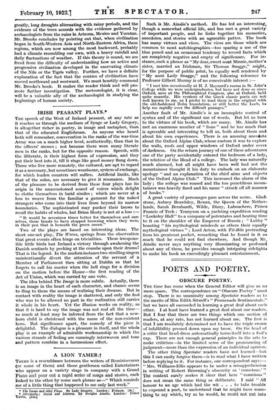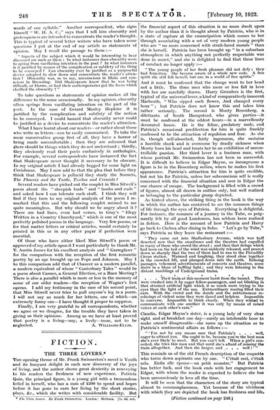POETS AND POETRY .
OBSCURE POETRY.
THE time has come when the General Editor will give us no more space. The correspondence on " Obscure Poetry " must stop. There is no unanimity among Spectator readers as to the merits of Miss Edith Sitwell's " Promenade Sentimentale," but we have all succeeded in learning a great deal about each other. I at least have learned a great deal about our readers. But I fear that there are two things which one section of readers, at any rate, has not learned about me. The first is that I am resolutely determined not to have the triple crown of infallibility pressed down upon my brow. On the head of a critic that head-dress automatically turns itself into a fool's cap. There are not enough general principles in the arts to make criticism—in the limited sense of the pronouncing of judgment—more than the expression of an individual opinion.
The other thing Spectator readers have not learned—but this I can easily forgive them—is to read what I have written before replying to it. For instance, one correspondent says :- "Mrs. Williams-Ellis appears to be under a misapprehension in writing of Robert Browning's obscurity as ' conscious.' " The context surely makes it clear that here " conscious " does not mean the same thing as deliberate. I said " All honour to an age which had the wit . . . to take trouble to expound a poet, to understand that he might have some- thing to say which, try as he would, he could not nut into
words of one syllable." Another correspondent, who signs himself " W. H. A. C.," says that I tell him obscurity and grotesqueness arc intended to concentrate the reader's thought. This is typical of several letter writers who have taken some questions I put at the end of my article as statements of opinion. May I recall the passage to them :-
" Aspects of the subject which it would be interesting to hear discussed are such as these : In what instances does obscurity seem to spring from vacillating intention in the poet ? In what instances is it justified by reason of the complication or subtlety of the thing to be conveyed ? Can obscurity ever be justified as a purposeful device adopted to slow down and concentrate the reader's atten- tion ? Obscurity was, so to say, unconscious in Blake and con- scious in Browning. Did Shakespeare know that he was being difficult, or Donne, or had their contemporaries got the focus which clarified the obscurity 7 "
To take questions as statements of opinion makes all the difference to the sense occasionally. In my opinion, obscurity
often springs from vacillating intention on the part of the poet. In the case of Gerard Manley Hopkins it is justified by the complication and subtlety of the notion to be conveyed. I could hazard that obscurity never could
be justified as a device to concentrate the reader's attention.
What I have learnt about our readers—or rather about those who write us letters—can be easily summarized. To take the more conservative group first of all, they have a horror of being made uncomfortable ; then they are ashamed that there should be things which they do not understand ; thirdly, they obviously read their poets exclusively in anthologies. For example, several correspondents have instanced the fact
that Shakespeare never thought it necessary to be obscure. In my original article I had already begged for some light on Coriolanus. May I now add to that the plea that before they
think that Shakespeare is pellucid they study the Sonnets, The Phoenix and the Turtle, Troilus and Cressida I Several readers have picked out the couplet in Miss Sitwell's poem about the " sheepish buds " and " lambs and cuds " and asked how I can tolerate such stuff. I think they will find if they turn to my original analysis of the poem I re- marked that this and the following couplet seemed to me quite meaningless. But why should we be angry about it ? There are bad lines, even bad verses, in Gray's " Elegy Written in a Country Churchyard," which is one of the most perfectly polished poems in the language. Very few poems, or for that matter letters or critical articles, would certainly be printed in this or in any other paper if perfection were essential.
Of those who have either liked Miss Sitwell's poem or approved of my article upon it I want particularly to thank Mr.
T. Austin James for his excellent analysis and " Garregfawr " for the comparison with the reception of the first romantic poetry by an age brought up on Pope and Johnson. May I to this comparison add that of Chaucer as a modern parallel, a modern equivalent of whose " Canterbury Tales " would be a poem about Cannes, a General Election, or a Race Meeting? There is also a parallel which is more or less in the memory of
some of our older readers—the reception of Wagner's first operas. I add my testimony in the case of his second point, that Miss Sitwell never- tries to pull anyone's leg in a poem.
I will not say as much for her letters, one of which—an extremely funny one—I have thought it proper to suppress. Finally, I am very grateful to all correspondents, whether we agree or we disagree, for the trouble they have taken in giving us their opinions. Among us we have at least proved that poetry is a living—nay, a lively—issue, not to be



































































 Previous page
Previous page